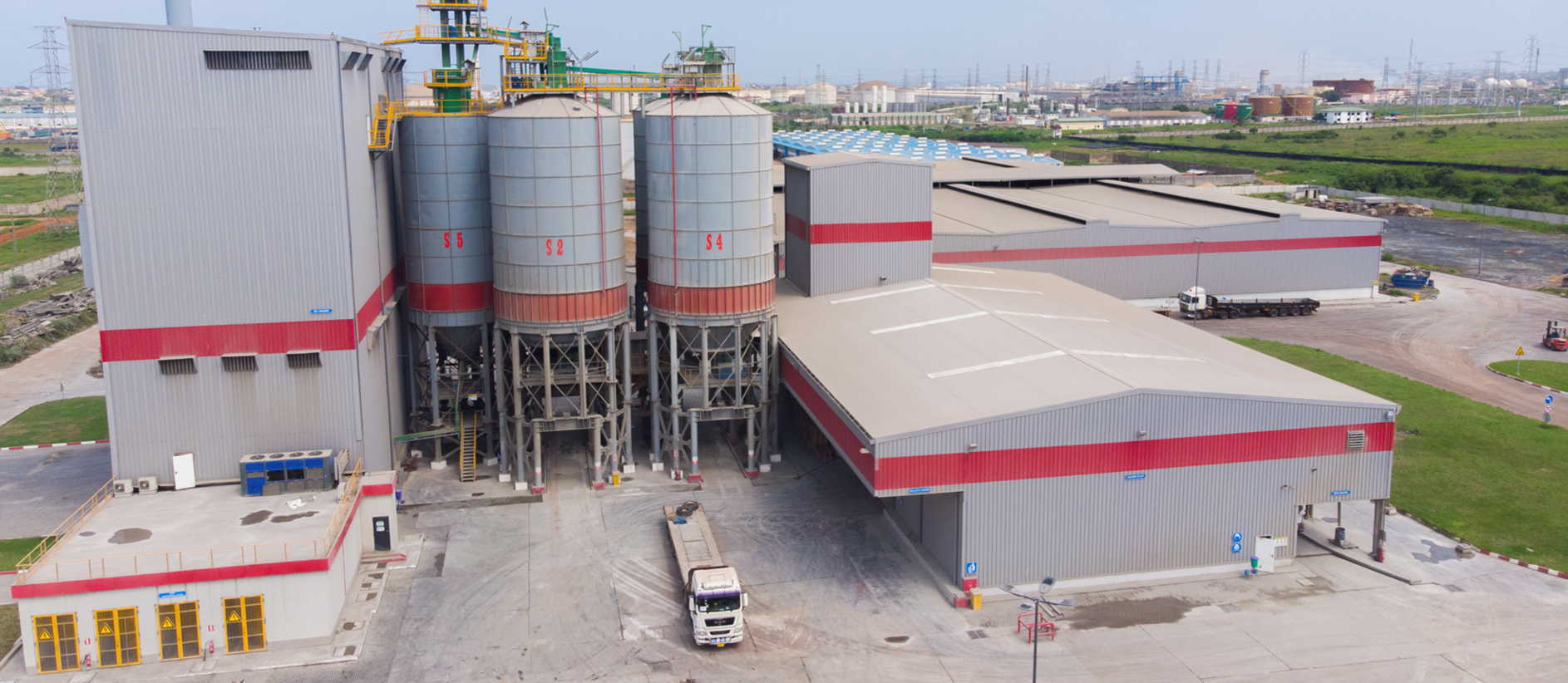IFU and Norfund have invested USD 27.9m in Continental Blue Investments Ghana Limited (CBI). The company is a leading producer of cement in Ghana and operates a 550,000 tons p.a. facility outside Accra in southern Ghana. The cement is sold under the brand name Supacem for commercial, industrial and residential construction projects, as well as complex infrastructure.
The new investment supports CBI’s plan to almost triple the production to 1.4 metric tons annually. As the production of cement is one of the heaviest global emitters of carbon, the investment includes the building of a 405,000 tons per annum clay calcination unit, which is the world’s largest calciner system to date.
The purpose is to use locally sourced calcined clay instead of imported clinker, which is a major contributor to the high emissions from the production process. The substitution will lead to a reduction of carbon emissions by up to 20 per cent per ton cement produced without compromising the quality of the product. Including the sale of calcined clay to other cement producers in Ghana, the total avoided emission is expected to be close to 30 per cent compared to current production technology.
The introduction of calcined clay in the production of cement supports the green transition and is in line with the EU green taxonomy, that sets an upper limit for CO2 emissions intensity.
FLSmidth delivers technology and equipment
The Danish company FLSmidth will deliver the technology and equipment for the expansion of CBI’s production as well as the clay calcination unit. CBI expects both financial and environmental return on the investment from lower CO2 emissions, energy and fuel saving and reduced cost from clinker imports.
“The production of cement is a very large contributor to global carbon emissions, but the product is also indispensable when it comes to developing infrastructure, including wind parks, for example. With this investment we support the green transition by reducing the carbon footprint whilst increasing locally produced cement that will contribute to Ghana’s further development.”
Torben Huss, CEO of IFU.
“We are excited to partner with and support CBI’s leadership team, its Board and its existing investors, and look forward to actively working with these stakeholders and our co-investor partners IFU and FLS to support this proactive company in their market-leading effort to reduce carbon emissions in an essential sector for development – cement manufacturing. The added benefits of job creation and import substitution for Ghana are of great importance to us as well,” said Naana Winful Fynn, Regional Director for West Africa for Norfund.
“The significance of this order cannot be overestimated – clay calcination is yet another example of how the cement industry is responding to the need for more environmentally friendly processes. The CBI project in Ghana marks a key milestone in the green transition of the industry,” said Carsten Riisberg Lund, Cement Industry President, FLSmidth. “It is our second record-breaking clay calcination order in less than a year and one that is set to become the world’s largest installation. We are very happy to have a series of financing partners on board to make this deal happen, both IFU, the Norwegian NORFUND and EKF in cooperation with the bank Société Générale have shown true commitment to the sustainability aspects of this project.”
“Ghana is the perfect location for using clay as an environmental alternative to clinker,” said Frédéric Albrecht, CEO at CBI Ghana Ltd. “We are witnessing an increasing demand for cement in the region, but low-quality limestone has previously forced us to import clinker. With the help from FLSmidth, we can now increase our capacity without compromising on the environment,” Frédéric Albrecht concluded.
IFU’s investment is made on behalf of the Danish SDG Investment Fund, which is backed by large Danish pension funds and private investors.
About
Norfund is the Norwegian Investment Fund for developing countries. Our mission is to create jobs and to improve lives by investing in businesses that drive sustainable development. Norfund is owned and funded by the Norwegian Government and is the Government’s most important tool for strengthening the private sector in developing countries, and for reducing poverty. Norfund’s committed portfolio totals 3.3 billion USD in Sub-Saharan Africa, South-East Asia, and Central America. Norfund has four investment areas: Clean Energy, Financial Institutions, Scalable Enterprises and Green Infrastructure. Investments in Clean Energy account for about 50% of the portfolio and 50% of the portfolio is in Sub-Saharan Africa. www.norfund.no
FLSmidth provides sustainable productivity to the global mining and cement industries. We deliver market-leading engineering, equipment and service solutions that enable our customers to improve performance, drive down costs and reduce environmental impact. Our operations span the globe and we are close to ~10,100 employees, present in more than 60 countries. In 2021, FLSmidth generated revenue of DKK 17.6 billion. MissionZero is our sustainability ambition towards zero emissions in mining and cement by 2030. FLSmidth works within fully validated Science-Based Targets, our commitment to keep global warming below 1.5°C and to becoming carbon neutral in our own operations by 2030. www.flsmidth.com
Continental Blue Investments Ghana Limited (CBI) operates since 2019 a cement grinding station in Tema (Ghana) that produces 550,000 tons per year for industrial and residential construction and infrastructure, sold under the brand SUPACEM. CBI vision is to offer local consumers throughout Ghana a world-class professional and reliable option for best quality and affordable cement products. Currently CBI employs 400 Ghanaians both directly and indirectly In line with its sustainable vision, CBI Ghana Ltd is expanding its production capacity and implementing a clay calcination unit – a pioneering technology developed by FLSmidth which aims at substituting imported Clinker by locally sourced Calcined clay, reducing substantially CO2 emissions and improving productivity of cement production. www.supacem.com

